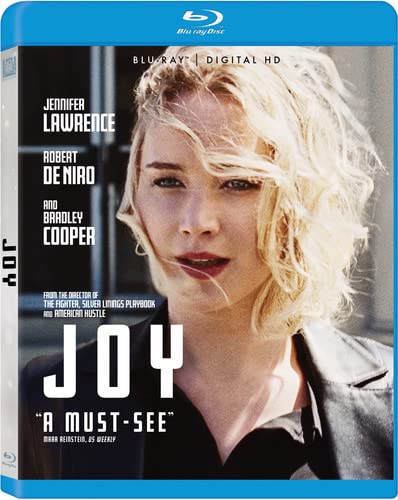
David O. Russell’s Joy has gotten somewhat lost in the awards season shuffle, and that’s a shame. It nabbed only one nomination, for its always-wonderful star Jennifer Lawrence, in the title role as real-life Miracle Mop inventor Joy Mangano. In a less competitive year it probably would have earned nods for its clever screenplay by the director and its story by Bridesmaids co-writer Annie Mumolo, as well as best supporting actor nods for either Bradley Cooper or Robert De Niro and a scene-stealing Isabella Rossellini.
Joy is a feature-length rebuke to the old chestnut that “If you build a better mousetrap, the world will beat a path to your door.” Joy builds a better floor mop, and she practically has to shove it into people’s hands to even get them to try it, much less buy it. How she triumphs after more setbacks than you can count is the story, and it makes for an entertaining if somewhat overlong movie.
Many of Joy’s enemies are close to home. Her family is mostly too selfish, self-absorbed and/or spaced out to give her any meaningful support — despite (or because of) the fact that Joy is, tragicomically, always there for them. She has two young kids of her own but in truth she’s the mother to a large and dysfunctional brood that includes her father (De Niro), one of those traditional guys who unthinkingly depends on the woman in his life (whoever she is at the moment) to take care of all those pesky little details like cooking, cleaning, laundry, etc.
There’s also Joy’s helpless, soap-opera-obsessed mother (Virginia Madsen), agoraphobically tethered to her bedroom but still made up and coiffed as if she were about to head into New York City. Joy’s passive-aggressively jealous half-sister Peggy (Elisabeth Rohm) and her charming but chronically underemployed ex-husband (Edgar Ramirez), who continues to live in Joy’s basement despite their marriage being over, are also both speed bumps on Joy’s road to success. Only her grandmother Mimi (the wonderful Diane Ladd), who narrates the movie, is unequivocally on Joy’s side.
Director Russell has always been interested in the ways families both make and break us, how children often end up parenting their parents and how even well-intentioned parents screw up their children. From Spanking the Monkey and Flirting With Disaster in the 1990s to the underrated I Heart Huckabees in 2004 and 2012’s Silver Linings Playbook, Russell has shown that home is the place where, when you have to go there, they have to let you in — but there’s always a price.
In Joy, the story has the contours of both a family romance and a fairy tale. Joy is Cinderella, slaving away but dreaming of her chance to go to the ball. Rohm is the wicked stepsister and Madsen is Sleeping Beauty, eventually awakened by a charming plumber. Rossellini, as De Niro’s new girlfriend, a wealthy widow, seems at first to be the fairy godmother, but she turns out to be the wicked queen in a clever disguise.
Interestingly, Joy finally finds her own strength by learning who to trust — first herself, then her friends (including Dascha Polanco as her childhood friend Jackie) and her ex-husband. Her relations with her relations stay strained even after she triumphs.
Russell keeps the “magic” and the symbolism light, with a realistically run-down house and naturalistic performances. The exception is the movie’s highlight, a trip by Joy to a wondrous Land of Oz that’s actually the studios of the home shopping network QVC. There Bradley Cooper, as QVC exec Neil Walker, shows her “how the sausage is made,” how the mind-numbing repetitiveness of the network’s presenters actually works to sell products.
Eventually Joy herself becomes her own best TV pitchwoman, because she has learned the true value of her invention — and of herself. This movie has given me a new and non-ironic respect for entrepreneurs and salespeople. And kudos to Russell for keeping Lawrence and Cooper’s relationship platonic rather than romantic, but one of the movie’s strongest bonds nonetheless.
Joy is a truly feminist movie, unlike the insulting faux feminism of The Intern, also with Robert DeNiro. That it’s also an enjoyable comedy-drama is a credit to the always amazing Lawrence, the talented director/screenwriter Russell, and a cast that strikes the right balance between playing fairy-tale archetypes and recognizably flawed human beings.